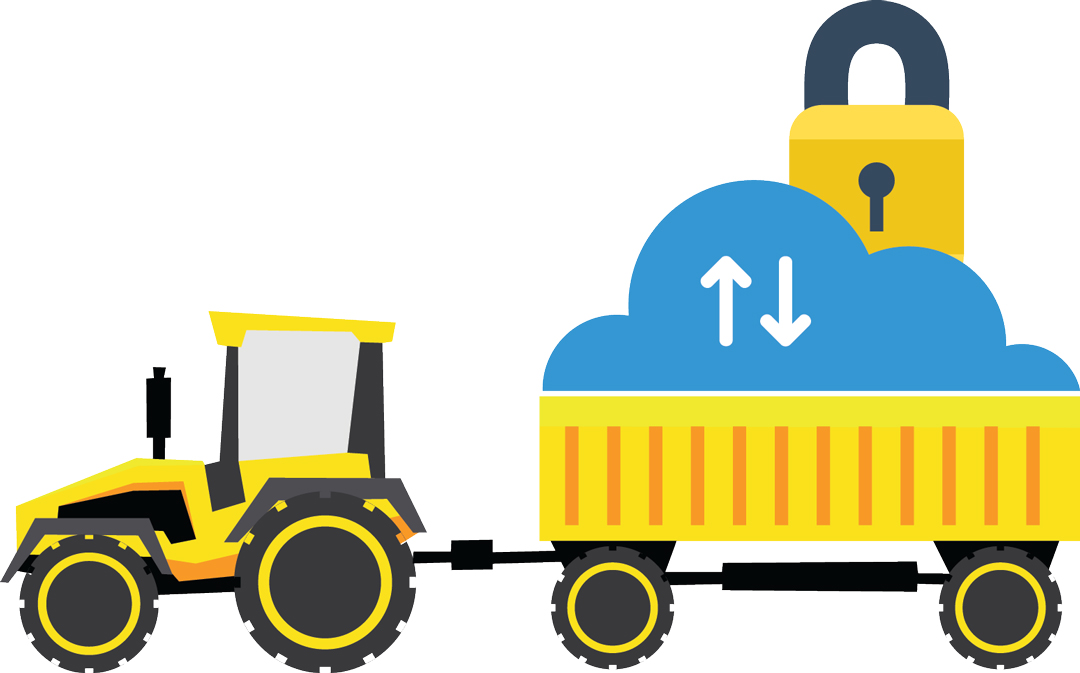SECURING THE DATA HARVEST
AG SERVICE PROVIDERS HELP FARMERS PROTECT DIGITAL INFORMATION
BY ALLISON FINNAMORE
In an age of precision farming and mobile management apps, farmers have become increasingly aware that security and protection of the massive amount of data they generate is a crucial aspect of handling that information.
Todd Janzen is an agricultural lawyer and administrator with Ag Data Transparent (ADT), a non-profit organization based in Indianapolis, Indiana. Representing a coalition of major farm organizations, commodity groups and agricultural technology providers, it audits corporate ag data contracts signed by farmers.
The group developed the ADT seal of approval, recognizing compliance with its principles. Among these, are a commitment to the use of simple language in contracts; an outline of expectations for data ownership, collection, access and control; a pledge to maintain transparency and consistency; non-disclosure to unauthorized parties; and, maintenance of security safeguards.
Janzen explained that while farmers own the data created on their farms, “there are multiple stakeholders that may have an interest in the farmer’s data when using online platforms. Farmers are responsible for making sure the data they upload is theirs, or used by permission.” It’s all in the agreements farmers sign when using ag data platforms.
Kelly Bronson, Canada’s research chair candidate in science and society at the University of Ottawa, has been studying digital farming in Canada for several years. “A digital agricultural revolution is certainly afoot,” she said.
However, she pointed out there has been little critical reflection, among either practitioners or academics, about the social implications of the data collection, and it is important farmers proceed with care. Bronson’s research is based on studying the landscape of digital farming in Canada and its accompanying regulatory decisions. While research is ongoing, she said preliminary findings suggest the role these digital innovations play in Canadian agriculture is complex.
Janzen, however, noted that industry is moving on regardless of academic research. Having attended InfoAg 2018, a Missouri conference focused on precision agriculture, he also noted ag data platforms have come of age. “A few years ago, the trade show would have been crowded by ag data collection and storage tools, but those seem to have dwindled this year. I think that is because ag data platforms have matured and there is no longer much room for new entrants in the marketplace,” he said. Due to mergers and acquisitions, the marketplace also has fewer players.
Remi Schmaltz, CEO of Decisive Farming, an Alberta-based company providing a range of agronomic and farm management services, said it’s important to define the term “data security” with farmers. Is it a matter of a third party, rogue hacker, accessing data without permission? Or does the intent of the term relate to farm data that a farmer may be willing to share, but wants to ensure it lands in the right hands?
In the case of basic data security against general breaches, Schmaltz stresses the importance of security practices with customers, including selecting a reputable cloud service as well as redundancy in backup and browser encryption. As for data security that ensures farm information lands in the right hands, Schmaltz said farmers have the advantage.
“For very specific farm information, there’s definite value there. What a farm is producing has an impact on a lot of different businesses,” he said. For instance, his company gives farmers the opportunity to benefit from the sale of their own data. Earlier this year, the company started a program to pay producers $4 an acre for their data when they signed up for Decisive Farming variable rate technology services on malt barley acres.
“We’re clear with farmers that they own the data and they are able to benefit by being able to share their data with trusted service providers,” said Schmaltz. He added that farmers are now asked by seed companies, lenders, input providers and statisticians to share cropping data at no charge, which suggests there could be opportunities to monetize this information as they come to appreciate the value of their own data. Maintaining overall trust and security is critical for any service provider, said Schmaltz.
Fred Wall, marketing vice-president with Farm Credit Canada (FCC), agrees. FCC recently became the first Canadian company to receive the ADT seal for its commitment to safeguarding farmers’ data collected through its AgExpert software. The commercial Crown corporation released its new web-based version AgExpert Field earlier this year and is expected to launch a web-based version of its farm financial software, AgExpert Accounting, in the near future. AgExpert Field now enables a farmer to record, share and analyze field data—such as inputs, yields and conditions—from their phone.
“Transparency and integrity are fundamental to what we do,” said Wall. “We want our customers, the producers, to know we are taking this seriously. Third-party verification shows they can trust us with their information.”
For Janzen, it’s another step in the coming of age story of ag data security. “All the companies and organizations that designed ADT understood the need for transparency and trust in the ag precision sector,” he said. “They knew that data and analysis will continue to change and improve agriculture, but that the producer deserves to work with credible data partners. Certification shows a commitment to the producers, the backbone of the ag industry.”
As data security technology continues to develop in agriculture, it’s expected farmers will become more familiar with handling it, recognizing its value and perhaps finding ways to monetize the data, all the while keeping their farm information protected and secured.







Comments